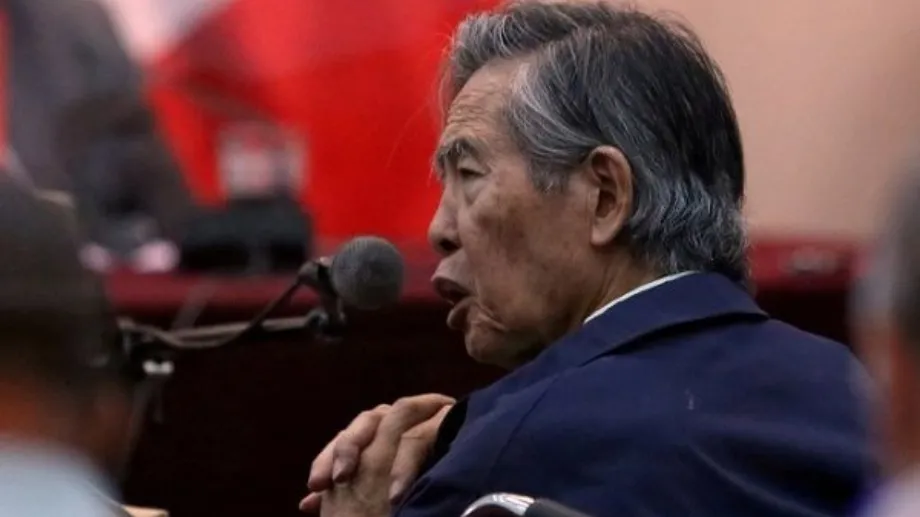What Fujimori’s legacy teaches Latin America about trading democracy for security

Disclaimer: Opinions expressed in this commentary are those of the author and do not necessarily represent the institutional position of International IDEA, its Board of Advisers or its Council of Member States.
Nothing focuses the mind like a close shave with a bomb. I remember being shaken to the core after escaping a packed cinema in the upmarket district of Miraflores when two small bombs went off. My weeks-long effort to give up smoking vanished on a sidewalk outside as I puffed away on the mistaken assumption they would calm trembling hands.
I also remember thinking then how much I really wanted Fujimori to succeed—no matter what.
I had unwittingly joined the ranks of Peruvians supporting a politician who was perhaps the first example in Latin America of a populist outsider promising to go where no other politicians would go before—a no-nonsense clampdown insecurity and corruption.
Fujimori goes to his grave after being sentenced to 25 years in 2009 for kidnapping and murder. He was released last year after spending 16 years in prison, in a controversial humanitarian pardon. But it can be easy to forget how popular Fujimori was in his early years—and why that is a warning for a contemporary Latin America facing the seduction of populist and authoritarian solutions.
His 1992 ‘self-coup’, when as president he closed Congress and jailed opposition leaders, enjoyed popular support. In his first term he tamed hyperinflation, introduced far reaching market reforms that boosted growth, while subduing two insurgencies from the Shining Path and Tupac Amaru movements.
Covering his relatively easy reelection in 1995, it was easy to see his appeal over the older, former U.N. Secretary-General Javier Pérez de Cuéllar. When Fujimori headed out to Andean villages and coastal shantytowns in a T-shirt, jeans and wellington boots, he looked comfortable. The suited Perez de Cuellar appeared that he missed the comfort and etiquette of the vaunted halls of the UN headquarters in New York.
Peak Fujimori probably occurred in 1997 when Peruvian special forces stormed the Japanese Embassy in Lima to free dozens of diplomats and politicians held hostage by leftist rebels. In fact, it was the beginning of the end. By 2000 he escaped to Japan, ousted from power, immersed in corruption scandals, mostly involving his spy chief Vladimiro Montesinos, nicknamed then Fujimori’s ‘Rasputin’.
With hindsight, Fujimori offered several lessons for today’s Latin America, immersed in increasing security challenges—this time not from leftist insurgencies but from drug trafficking, widespread inequality and illegal economies.
Firstly, leaders like Fujimori will offer short-term respite, at best. Fujimori’s legacy failed because of the tradeoffs that his rule engendered—the destruction of traditional political parties was replaced by centralized political corruption that fostered institutional decay. His contempt for the rule of law helped generate a vacuum felt today in Peru—now one of the continent’s most fragile democracies.
Secondly, leaders like Fujimori—a former agricultural professor who came from nowhere in 1990 to win a democratic election—only surface when traditional parties and leaders fail. Fujimori would have stayed an obscure academic if it were not for the corruption and chaos of Peru’s former leaders, Alan Garcia and Fernando Belaunde. Those two presidents ostensibly followed democratic norms of free elections but failed in elemental task of offering their citizens security, social wellbeing and trust in state institutions.
In the 1990s, Peru almost felt an outlier politically. Neighbours, such as Argentina Brazil and Chile, were tentatively shedding of the vestiges of military rule to embrace both democracy and economic reform. Now, Peru and its neighbours have rather too much in common—namely, that lack of citizens security and trust.
This time around, it is not a ‘dirty war’ between insurgents and the military, but basic citizens’ security that is allowing for the likes of El Salvador’s President Nayib Bukele.
Like Fujimori, Bukele rejects traditional parties. Like Fujimori, Bukele plays down the risk of rights abuses in the name of bringing citizens security—in his case with anti-gang crackdowns. Like Fujimori, the trade-offs are not immediately evident, but they are inevitable.
Across Latin America, countries are ripe for ‘Fujimorismo’. Citizens are clamouring for a clampdown of drug trafficking in Ecuador, where homicide rates have surged. In Peru, Ecuador and Nicaragua, around a half of respondents said they would support a coup to address security problems.
But ripe does not mean right. Fujimori is a warning for Latin American leaders—ignore your citizens’ security at your own peril.




